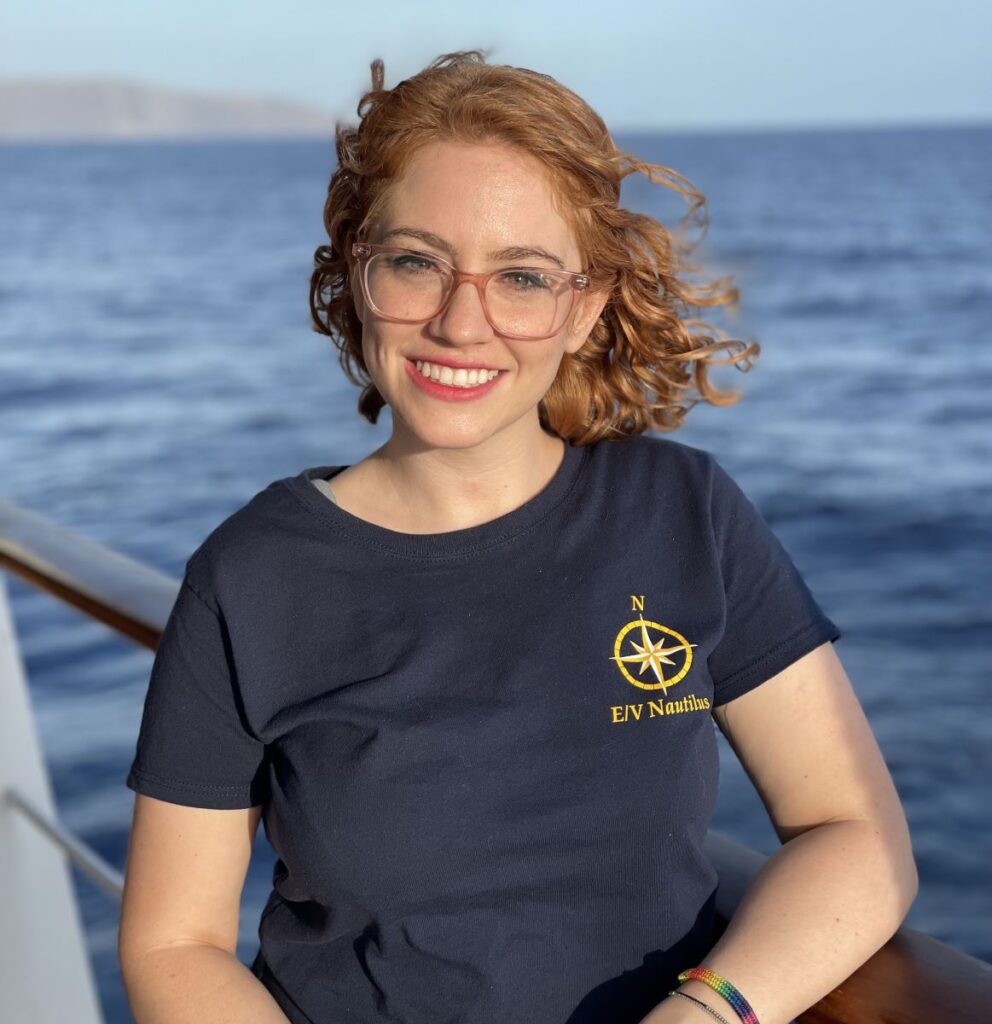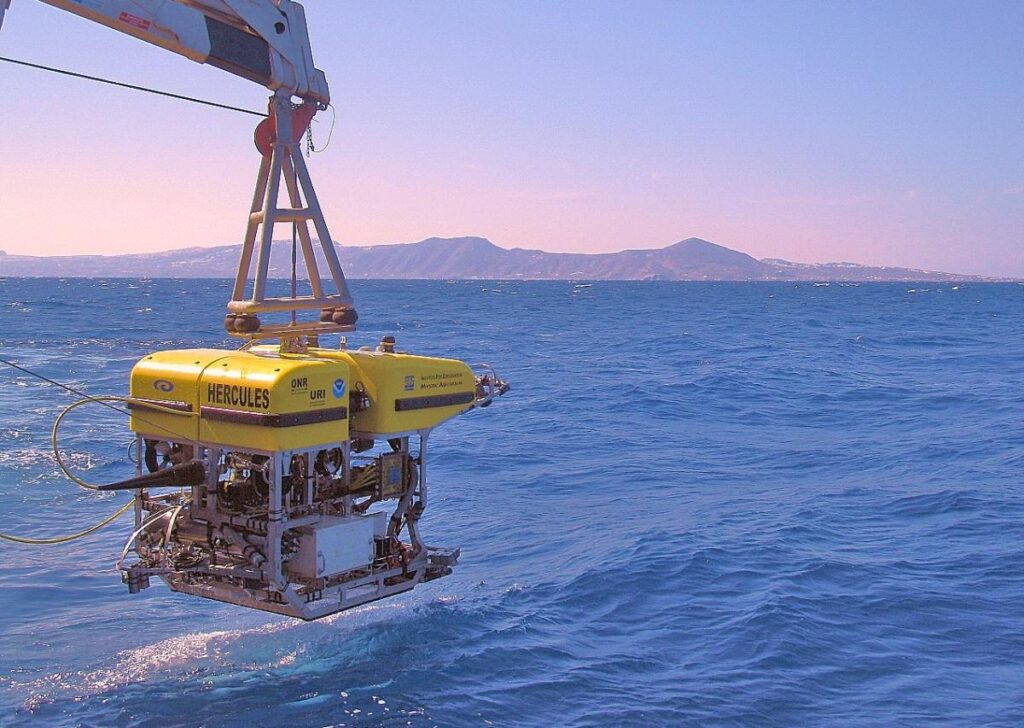Q&A: The 2023 Field Season of Exploration Vessel Nautilus

E/V Nautilus. Image courtesy of Ocean Exploration Trust.
16 May, 2023
Ocean Exploration Trust is launching its 2023 field season today aboard the Exploration Vessel Nautilus. We posed a few questions about research plans for this year to Jamie Zaccaria, OET’s Digital Media Specialist.
Could you please introduce yourself and your role with Ocean Exploration Trust?
My name is Jamie Zaccaria, and I am the Digital Media Specialist with the Ocean Exploration Trust. I work full-time in this role and sail a few expeditions yearly as a Communications Lead onboard E/V Nautilus. I earned my Masters of Science in Biodiversity, Conservation, and Policy from SUNY Albany with a thesis titled “Conservation Solutions to Shark Finning: Insights from Past Efforts.” Before working for OET, I worked for Panthera and The New Jersey Sierra Club.
So what are Nautilus Live and Ocean Exploration Trust?
Ocean Exploration Trust and the Nautilus Exploration Program seek out new discoveries in geology, biology, and archaeology while conducting scientific exploration of the seafloor. Our expeditions launch aboard Exploration Vessel Nautilus — a 68-meter research ship equipped with live-streaming underwater vehicles for scientists, students, and the public to explore the deep sea from anywhere in the world. We embed educators and interns in our expeditions who share their hands-on experiences via ship-to-shore connections with the next generation. Even while we are not at sea, explorers can dive into Nautilus Live to learn more about our expeditions, find educational resources, and marvel at new encounters.

Jamie Zaccaria, Digital Media Specialist with OET. Image courtesy of Ocean Exploration Trust.
The field season for E/V Nautilus is starting today. What are your main goals for the year?
In 2023, E/V Nautilus will spend eight months exploring the Central and Eastern Pacific, mapping unsurveyed seafloor and characterizing deep-sea habitats through detailed ROV observation, as well as integrating emerging technologies. Many of this year’s expedition activities will also advance NOAA mission priorities, particularly in terms of understanding ocean changes, sharing that knowledge with others, and conserving marine ecosystems. This work also focuses on OET’s priorities of education, diversity, and inclusion by creating more diverse and inclusive programs — both at sea and on shore — to ensure our exploration and education programs include, amplify, and make space for more historically marginalized voices in the deep-sea exploration and STEAM communities. Finally, the data collected on these missions is an essential precursor to future explorations throughout the region, undoubtedly leading to many discoveries. To this end, data and samples collected on these missions will be archived in publicly-available repositories to enable follow-on research and management activities.
The ocean is huge. How does OET decide on which areas to explore?
Nearly two-thirds of our planet is covered by water, yet over 95 percent of the ocean is unexplored. Exploring and documenting deep sea phenomena is critical for basic science and understanding our planet, conservation, and management. Expeditions are planned and executed around the priorities of the science and resource management community to close knowledge gaps in our unfolding understanding of our changing ocean planet. Mapping and ROV operations are primarily be conducted in unexplored areas, thus contributing directly to the US National Strategy for Ocean Mapping, Exploration, and Characterization, the development of a global high-resolution seafloor map by Seabed 2030, and the UN Decade of Ocean Science for Sustainable Development. Integrating different technologies, including autonomous underwater vehicles, into operations on E/V Nautilus, continues to advance national and international priorities for increasing the efficiency and sophistication of multi-vehicle ocean exploration. The 2023 E/V Nautilus expeditions are sponsored by NOAA Ocean Exploration via the Ocean Exploration Cooperative Institute, Ocean Networks Canada, the Office of Naval Research, and the Bureau of Ocean Energy Management.

ROV Hercules. Image courtesy of Ocean Exploration Trust.
E/V Nautilus’s first expedition this year will be exploring deep-sea habitats in and around the Pacific Remote Islands Marine National Monument. What are you hoping to find there?
Our first live expedition of 2023 brings us back to the region of Kingman Reef and Palmyra Atoll as part of our ongoing effort to explore the deep ocean in and around the Pacific Remote Islands Marine National Monument through the Ocean Exploration Cooperative Institute. This 29-day telepresence-enabled expedition will start and end in Honolulu, and utilize the deep-water mapping and ROV capabilities of E/V Nautilus to explore the deep-sea geology and biology in US waters. As we visit never-before-seen seamounts and habitats this year, for the first time, we will integrate the SETI Institute and Impossible Sensing’s deep-sea Laser Divebot/Raman Spectrometer into ROV operations. This sensor collects high-fidelity chemical composition data on materials, including rocks, sediments, and biological samples, eventually limiting the need for physical samples.
What’s the best way for people to follow along with your expeditions?
Nautilus is at the forefront of changing the way ocean science is conducted, turning viewers around the world into real-time oceanographic explorers. At the heart of this is our telepresence technology, which allows scientists, teachers, and students to participate in and contribute to the success of exploration. Our mission is to seek out the unknown in regions the scientific community has deemed a high priority for exploration. In doing such, we bring discoveries of the deep to classrooms, research institutions, museums, newsrooms, and your living room. As part of our effort to share expeditions, we utilize telepresence technology to stream live video from ROVs and various locations aboard the ship to global viewers tuning in to the Nautilus Live website. All you need is internet access to watch expedition dives in real-time. You can also follow us on Facebook, Instagram, LinkedIn, Twitter, YouTube, and TikTok.
DOSI Media Contact: Brandon Gertz, Director of Communications, DOSIcomms@gmail.com

